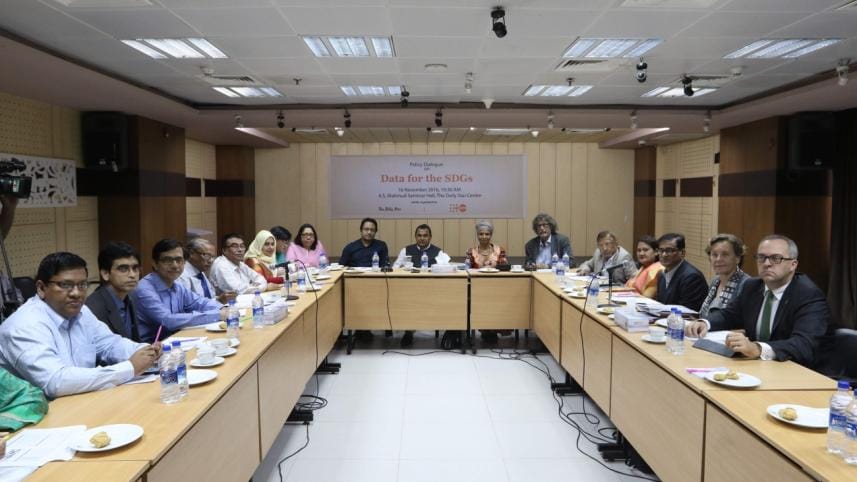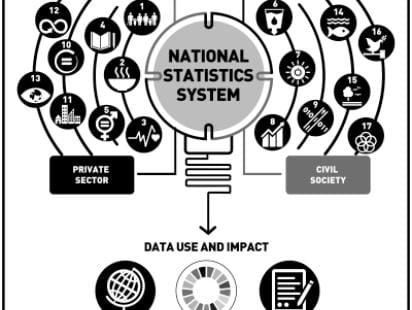Policy dialogue on data for the SDGs

An interactive and lively discussion looked into the issue of reliable and timely data and statistics for monitoring the progress towards the Sustainable Development Goals (SDGs) in Bangladesh. High level policy makers, academics, development partners and members of civil society attended the dialogue organized by UNFPA and The Daily Star. They highlighted the need for SDGs to be monitored and measured in real time to ensure success. There was a strong consensus that it is high time to mobilise political and financial commitments to support better data for the SDGs.
Lessons learned from the Millennium Development Goals have made it clear that monitoring is central in achieving goals. In the case of the MDGs data was collected, however with delays and a lack of comprehensiveness. The data collected could therefore not be used as a real-time management tool for governments, civil society organisations and businesses to measure progress and revise approaches where needed. To overcome these gaps, it is critically important to improve availability of data and analysis towards sustainable development in order to help governments track progress, ensure that decisions are evidence-based, and strengthen accountability, said participants at the dialogue.
The very idea of sustainability is directly linked with inclusiveness. The principles of inclusiveness and leaving no one behind are at the core of the 2030 Agenda. No one should be discriminated because of his or her age, sex, disability, race, ethnicity, origin, religion, and economic or other status. That's why to achieve sustainability disaggregated data is required - by geographic location and by sex and gender, but also by population groups, such as children, women of reproductive age, youth and elderly, ethnic and religious minorities and other vulnerable groups.
Planning Minister A H M Mustafa Kamal said that Bangladesh government is taking the SDGs seriously, and considers data collection as a vital tool in measuring the country's progress towards sustainable development. The SDGs and targets are incorporated in the national planning processes, particularly in the five-year plans. The recently passed Statistical Act, 2013, gives the Bangladesh Bureau of Statistics (BBS) the mandate to collect and endorse all official statistics. It will be the primary institution for generation of statistics, with assistance from the Bangladesh Institute of Development Studies (BIDS) and relevant government bodies, said the minister.

Pointing to the present status of the country's preparation for generating data relevant to the SDGs, a senior official of the Planning Ministry of Bangladesh explained that among the 230 SDG indicators, information on 63 indicators is available from the existing data generation system of the country. Data on another 67 indicators can be generated by slight modification of the existing system. For the rest 100 indicators, new surveys and means of data collection need to be developed, said the official. That's why the government is now focusing on generating administrative data from line ministries and other government institutions up to the grassroots level. A SDG cell has been set up at BBS. It focuses on data generation and gives an opportunity to have coordination among all other data producing agencies. A national strategy for development statistics has already been developed by BBS and a master plan soon to be finalized will address the data needs in a structured manner. So far, 44 projects have been identified to collect and analyse data in order to meet the 17 Sustainable Development Goals, said the government representative. Professor Dr. Shamsul Alam, member General Economic Division of the Planning Commission, highlighted the need for national household surveys more frequently to get efficient data.
Measuring progress and achievement of the SDGs requires a large amount of disaggregated data, which poses challenges, as data needs to be collected from various sources and aggregated in a structured manner. The government will be required to standardize data collection and data processing systems, said the experts present at the programme. Investments should be made in skilled human resources along with the application of modern technologies for data collection and management.
On the need for data and metrics, all the participants agreed that political commitment is vital. A stronger national leadership is needed to bring together relevant national entities that produce data that meet the demands for monitoring of the SDGs. More investment and technical assistance should be channeled for data generation, particularly in Civil Vital Registration System (CRVS), said the participants. It is also important to bring together international partners to avoid duplications in technical and financial assistance. The programme ended with the call for 'data revolution' that will significantly improve the statistical capacity of the country and better prepare it for achieving the Sustainable Development Goals.
 For all latest news, follow The Daily Star's Google News channel.
For all latest news, follow The Daily Star's Google News channel.
Comments